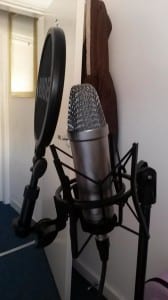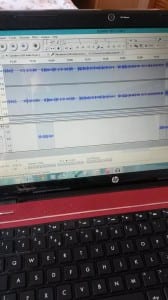We knew from the beginning that our performance was going to be heavy technically and it has proved to be quite challenging. So far we have recorded the entirety of our performance twice and have recorded other elements of our performance countless times before they were even close to being correct.
Where we recorded was very important to the quality of the sound. “It is particularly important to minimise early reflections from nearby objects such as tables and walls” (White, 2003) different objects can absorb sound so in order to get the optimum recording we had to adjust our surroundings, moving furniture so placing the microphone in an area where sound would not be lost.
We are using a Rode microphone to record our performance and the sound editing software Audacity to edit. The first time we began to record we were beginners to using this equipment for spoken word so it took a little while to understand how we were meant to use the technology and also how to speak so our voices were picked up loud enough by the microphone.
Our first draft used a reverb, or a type of echo, we wanted to see if we could add the effect to make our voices seem flowy and a bit mystical. This idea didn’t work “reverb should be used very sparingly unless a special effect is sought” (White, 103) so when re recording we have not use the reverb effect.
When we had finished our first draft we also noticed that since we had recorded at different times then the sound levels were very different, some sections were very loud and others too quiet, so when re recording we did everything we could in one session, meaning that the audio is more level and easier to listen to.
We have completed our second draft and we are not expecting it to be perfect, each time we record we are getting better at understand how the technology works, so hopefully by the time our piece is performed, our sound editing skills will have drastically improved.
White, P (2003). Basic Microphones. Wiltshire: Antony Rowe Limited. 103


